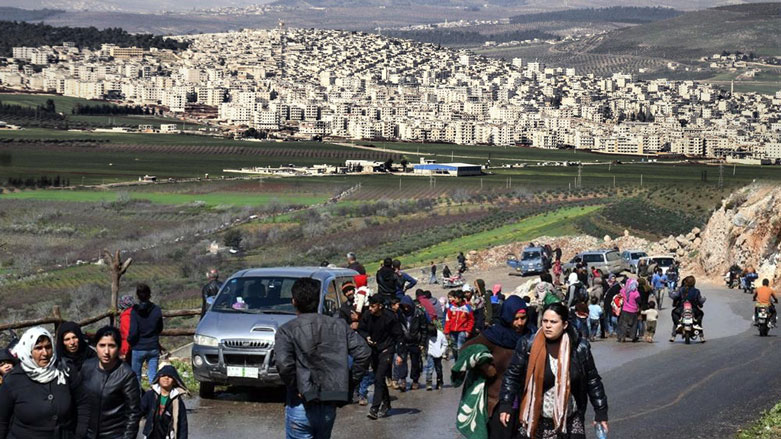After 3 years of Turkish occupation, Syrian Kurds condemn ongoing human rights violations in Afrin
Syrian Kurdish organizations have called for an end to human rights abuses in Afrin, three years after the Turkish occupation of the town began.

ERBIL (Kurdistan 24) - Three years after the onset of Turkey’s occupation of the northwestern Syrian city of Afrin, local Kurdish parties have called for the removal of Turkish-backed groups from the city and roundly condemned their human rights abuses against the population.
On March 18, 2018, Turkey and Turkish-backed rebels occupied the Kurdish enclave of Afrin during their so-called Operation Olive Branch. The occupation has continued amid widespread accusations of war crimes, including ethnic cleansing, kidnapping for ransom, and gender-based violence.
“Today is the painful third anniversary of the occupation of Afrin and the displacement of its people. Continuing the arbitrary arrest and abduction of women and the rape of Kurdish women, ethnic cleansing is taking place in Afrin,” Sinam Mohamed, representative of the Syrian Democratic Council (SDC) in Washington, told Kurdistan 24.
Mohamed, an Afrin native, added, “I call on the United Nations to guarantee the safe return of the people of Afrin and the exit of the armed groups. A political solution to the Syrian crisis after 10 years of this war is needed with the participation of SDC in political peace talks.”
In a statement, the SDC urged the United Nations, including the Security Council, “to adopt the position of the European Parliament” which recently called on #Turkey to withdraw from occupied territories in Syria and “to acknowledge that the Turkish presence in northern Syria is an occupation that must be ended.”
Read More: After a decade of conflict in Syria, EU parliament calls on Turkey to withdraw
The situation in Afrin, the group argued, should be restored to its former status, before the occupation began.
The Kurdish National Council (KNC), a member of the National Coalition of Turkish-backed Syrian Revolution and Opposition Forces (Etilaf in Arabic), also condemned the human rights abuses, North Press reported.
It pointed out that Turkey aims to target the Kurdish presence there, amounting to intentional ethnic cleansing, adding that “the suffering of the people of Afrin is still continuing and worsening due to the daily violations.”
The KNC statement called on the Syrian opposition bloc to abide by the implementation of the agreement signed with the KNC regarding the work to stop violations and return the displaced to their homes.
Rabah Ibrahim, a Kurd from Afrin living in Europe, lamented the situation in Afrin and the inability to return.
“Kurdish men and women were imprisoned, their homes and property were looted and looted, nothing was left on the earth or under the earth, all destroyed. Are the people of the world all deaf, blind and dumb?,” she told Kurdistan 24.
On this 3rd Anniversary of the #Turkish invasion of #Afrin, my heart breaks for those who lost family & friends, were victims of the many atrocities committed, or had to leave homes and communities.
— Nadine Maenza (@nadinemaenza) March 18, 2021
Honored to join in the call for a free Afrin. #Syria https://t.co/qKtODCqwWA
Nadine Maenza, Commissioner of the official US Commission on International Religious Freedom (USCIRF) has been a vocal critic of President of the Syrian Opposition Coalition (SOC), Nasr al-Hariri, who has denied human rights abuses by Turkish-backed groups in Afrin.
Read More: US religious freedom commissioner condemns Syrian opposition leader visit to Afrin
The Syrian opposition leader visited the Kurdistan Region’s capital of Erbil in early March and promised to improve the situation in Afrin.
On Thursday, Hariri planted olive trees together with members of the Turkish-backed Syria's Independent Kurdish Association in Afrin and the day before also participated in a Newroz celebration with the same group.
However, the ARK news agency quoted the Human Rights Organization in Afrin as saying that more than 1,000 Kurdish civilians, including women and the elderly, are still missing after being kidnapped by Turkish-backed factions.
Maenza said that she met a Yezidi (Ezidi) family in Afrin who was “forced to flee and their home was looted and taken by Turkey and its Islamist militias without payment. So many I met told similar stories.”
“The US Commission on International Religious Freedom continues to be worried about religious and ethnic minorities still in Afrin. We continue to receive reports of kidnapping, rape, and Christians being arresting for Apostasy.”
She pointed out that many independent organizations have documented human rights abuses in Afrin including Amnesty International, Human Rights Watch, and even the UN.
“It is only because of the severity of the crimes being committed in Afrin and other places that Turkey has invaded and occupies that the European Union would prioritize passing its resolution calling on Turkey to withdraw from Syria, suggesting they were committing ethnic cleansing,” she concluded.
Zerdest Azad, a pseudonym of a Kurd from Afrin living in Europe, said before the Turkish operation, “the Olive branch always symbolized peace, but since the occupation of Afrin its nothing more than a symbol for terror and destruction.”
He was not impressed by the Newroz celebration organized by the Syrian opposition. “Saddam Hussein also wore Kurdish clothes once; it doesn’t make a difference.”
Editing by John J. Catherine